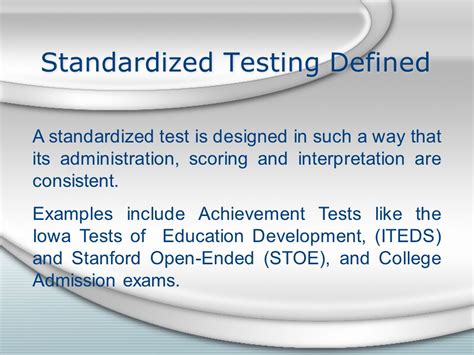A standardized test is an exam that is administered and scored in a consistent manner across a large group of test takers. This type of test is typically used to measure a person’s knowledge or skills in a particular subject area. Standardized tests are often used for educational purposes, such as determining college admissions or placement in certain courses. They can also be used for job placement or to assess the effectiveness of educational programs.

Characteristics of Standardized Tests
There are a number of key characteristics that define standardized tests. These include:
- Uniformity: Standardized tests are administered in the same way to all test takers, regardless of their location or background. This ensures that all test takers have an equal opportunity to perform well on the test.
- Objectivity: Standardized tests are scored by trained professionals who are not familiar with the test takers. This helps to eliminate bias and ensure that all test takers are evaluated fairly.
- Reliability: Standardized tests are designed to be reliable, meaning that they will produce consistent results when administered multiple times to the same group of test takers.
- Validity: Standardized tests are designed to be valid, meaning that they measure what they are intended to measure.
Types of Standardized Tests
There are many different types of standardized tests available. Some of the most common types include:
- Achievement tests: Achievement tests measure a person’s knowledge or skills in a particular subject area. These tests are typically used to assess student learning or to make placement decisions.
- Aptitude tests: Aptitude tests measure a person’s potential to succeed in a particular field. These tests are often used for college admissions or job placement.
- Personality tests: Personality tests measure a person’s personality traits. These tests are often used for job placement or to help people understand themselves better.
Uses of Standardized Tests
Standardized tests are used for a variety of purposes, including:
- Educational purposes: Standardized tests are often used to assess student learning and to make placement decisions. For example, standardized tests may be used to determine whether a student is ready for a particular course or to place a student in a gifted and talented program.
- Job placement: Standardized tests can be used to help employers assess the skills and abilities of job candidates. For example, an employer may require job candidates to take a standardized test in order to assess their math or verbal skills.
- Research purposes: Standardized tests can be used for research purposes to study topics such as educational trends or the effectiveness of educational programs.
Benefits of Standardized Tests
There are a number of benefits to using standardized tests. These benefits include:
- Objectivity: Standardized tests are scored by trained professionals who are not familiar with the test takers. This helps to eliminate bias and ensure that all test takers are evaluated fairly.
- Reliability: Standardized tests are designed to be reliable, meaning that they will produce consistent results when administered multiple times to the same group of test takers.
- Validity: Standardized tests are designed to be valid, meaning that they measure what they are intended to measure.
- Comparability: Standardized tests allow test takers to compare their scores to the scores of other test takers. This information can be helpful for making educational or career decisions.
Criticisms of Standardized Tests
There are also a number of criticisms of standardized tests. These criticisms include:
- Bias: Some critics argue that standardized tests are biased against certain groups of people, such as minorities or students from low-income families.
- Narrowness: Standardized tests only measure a limited range of skills and abilities. This means that they may not be a fair assessment of a person’s overall intelligence or potential.
- Stress: Standardized tests can be a stressful experience for test takers. This stress can interfere with their performance on the test.
- Cost: Standardized tests can be expensive to administer and score. This cost can be a burden for schools and families.
Conclusion
Standardized tests are a widely used tool for assessing knowledge and skills. They have a number of benefits, including objectivity, reliability, validity, and comparability. However, there are also some criticisms of standardized tests, such as bias, narrowness, stress, and cost. It is important to weigh the benefits and criticisms of standardized tests carefully before making a decision about whether or not to use them.
